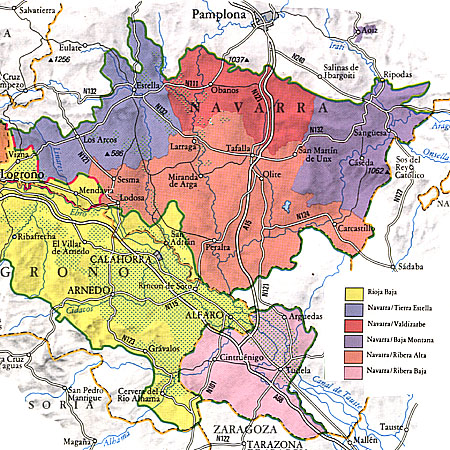
WineRegionsOld WorldSpain
NAVARRA
Not quite in the same league as Rioja, yet capable of producing some very
fine wines that are usually exceptional value, the wine-growing region of
Navarra lies south of Pamplona, overlapping part of Rioja Baja. It consists
of 26,500 hectares (65,500 acres), of which 18,000 hectares (44,500 acres)
are classified as DO Navarra. Recent marketing successes have reversed a
certain decline in the area that had driven some growers to plant asparagus
and artichokes rather than vines. This revival has encouraged some ambitious
experiments with classic foreign grape varieties. Cabernet sauvignon has
been an authorized variety on an experimental basis for some years, but
several others are now being investigated by the Estacion de Viticultura
y Enologia de Navarra (EVENSA), Spain's most advanced viticultural and oenological
research station. It is based in Olite, in the Ribera Alta, land has a number
of sub-stations situated throughout all the districts of Navarra. Merlot
is likely to become an approved variety and others under consideration include
Chardonnay Pinot noir, Gamay Syrah, Chenin blanc, Gewurztraminer, Sangiovese,
Barbera, Rhine riesling and even Ruby cabernet, the Californian cross.
Navarra's wine industry
Navarra has 84 bodegas, of which no less than 52 are cooperatives but only
16 have any record of exporting their products and, of these, just four
actually vinify and age the wines on their own premises. One of these four
is, however, the central Union Territorial de Cooperativas de Campo, or
UTECO for short, which could profitably extend its export activities to
all cooperatives.
NAVARRA'S DISTRICTS The region is divided into five districts:

Baja Montana
Vineyards: 4,000 hectares (9,884 acres)
Grape varieties: Garnacha, Tempranillo 50%, Others 50%
Situated in the Montana foothills, Baja Montana is the highest and wettest
area of Navarra and the vintage is considerably later here than in the south
of the region. Extra rain means the grape yield is between 50 and 100 per
cent higher than in any of the other four areas. The district produces some
of Navarra's best roses, fresh and fruity in aroma and flavor.
Ribera Alta
Vineyards: 8,100 hectares (20,015 acres)
Grape varieties: Viura 40%, Tempranillo 25%, Garnacha 15% Malvasia 10%
The largest of Navarra's five districts, Ribera Alta borders the Rioja Alta
and produces some of the region's finest wines The roses are smooth and
aromatic, the reds soft and fruity and the whites are soft, dry and fresh.
Ribera Baja
Vineyards: 8, 000 hectares (19,768 acres) Grape varieties: Garnacha 45%,
Viura 30%, Malvasia 10%, Muscat d petits grains 10%, Others 5%
This very hot and dry region includes approximately 20 per cent of Rioja's
Baja district and produces typically deep colored, full and robust red wines
and a few sweet Moscatels
Tierra Estella
Vineyards: 4,000 hectares (9,884 acres)
Grape varieties: Tempranillo 55%, Garnacha 15%, Mazuelo, Graciano 20%, Others
10%
Climatically similar to Valdizarbe in the north of the area, though getting
gradually drier further south, the Tierra Estella makes pleasant, fruity
reds and roses from the Tempranillo, but those from the Garnacha tend to
oxidize. Some crisp white wines from the Viura are also produced.
Valdizarbe
Vineyards: 2500 hectares (6,177 acres) Grape varieties: Tempranillo 45 %,
Garnacha 4 5 %, Mazuelo, Graciano and others 10%
A district with a slightly drier climate than the Baja Montana. Excellent
value red and rose wines from the Tempranillo are produced here, although
some have a tendency to oxidize.
Rioja
Navarra
Penedes